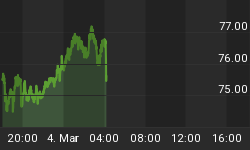We spent much of last week talking about liquidity, attempting to define or clarify the term by differentiating "market liquidity" and "money liquidity".
From there, we went on to question how investment markets are impacted by the liquidity created by central banks.
Today we look at how market participants are reacting to recent "liquidity injections" by the world's leading central banks.
As you may have read, the Federal Reserve and the European Central Bank (ECB) have been supplying liquidity to the banking system in the form of loans and repurchase agreements. This action on the part of the central banks began last Thursday and has continued through today.
The only problem is that the markets are now starting to wonder if these liquidity injections are enough to keep a financial crisis or an economic downturn at bay. Traders are now betting that central banks will have to reverse their stances on maintaining or raising key interest rates.
Excerpts from Bloomberg's article regarding "Rates U-Turn".
Days after reaffirming their interest-rate stance against inflation, central bankers may be forced to do an about-face. Traders are paring bets on imminent rate increases in Europe and Japan, and some even speculate the Federal Reserve may execute an emergency cut.
Behind the changed outlook is concern that the steps central banks have already taken -- pumping cash into markets over three days to avert a credit collapse -- won't be enough to keep global growth from stalling. In the days before, Fed Chairman Bernanke, 53, and European Central Bank President Trichet, 64, were saying inflation, not financial instability, was the biggest risk.
Just before last week's turmoil, Trichet signaled the ECB would lift its benchmark rate in September, and Bernanke indicated the Fed had no plans to cut rates. On Aug. 8, Bank of England Governor Mervyn King, 59, said he didn't see ``an international financial crisis;' investors were merely reappraising risk
So, there is presently some debate about whether or not the Fed and other central banks will be moved to cut rates at some point in the not-too-distant future. You can read on at the article link above for more discussion on this topic.
Also interesting to see this article, "Panic on Wall Street spreads fears", from The Australian over the weekend. As the article details, the extent to which the subprime/CDO fallout has spread throughout the world's financial markets has been a shock to many in the markets, possibly even to those who were preaching "containment" only days and weeks beforehand.
A few interesting quotes and passages from that article:
"There's been real distress selling. Whether it's hedge funds facing redemptions or people trying to cover their margins, I don't know. It's the first time we have seen selling like this since the start of the current bull run in 2003."
"It's a complete bloodbath," one trader said. "I can't tell you how bad it is. This boom hasn't really been caused by India or China or anything substantial; it's a massive amount of money and debt and deals that have grown out of nowhere. In 2002, you couldn't borrow a penny, but recently no amount has been too big. Now we're worried that, since the money appeared as if by magic, it can disappear like magic too."
There were also fears expressed over the possible collapse of a major investment bank.
Meanwhile, concerns were mounting over other German banks. The focus, however, may switch back to the US. Rumours abound of "another Drexel", recalling the 1990 collapse of Drexel Burnham Lambert, Wall Street's biggest ever bankruptcy.
The rumours point to a leading investment bank sitting on tens of billions of dollars of losses as a result of the sub-prime crisis and the shake-out in credit markets.
This is precisely the type of situation we wondered about in our June 13 post, "Asset backs, subprime: shades of 1990?".
As it is plainly obvious to anyone now, fears over subprime and credit market fallout have not subsided since June; they have only intensified as the problems reverberate throughout the world's financial markets.
Still, there is some debate over whether or not these events will affect the stock markets and the global economy in the near future. We have plenty of debate on these topics courtesy of Bloomberg.com audio/video reports. You can view them here now.
1. Noted value investor David Dremen speaks with Bloomberg TV. He says that while there are serious problems with the subprime/CDO fallout, the recent stock market sell-off has been due to the financial problems in the credit market and that U.S. stocks are not overvalued.
2. A medley of opinions on last week's credit crunch and the outlook for markets.
3. An audio interview with Marc Faber, who sees a "colossal recession" coming to the U.S. He also warns that a deleveraging effect in the markets will be a negative for asset prices.















